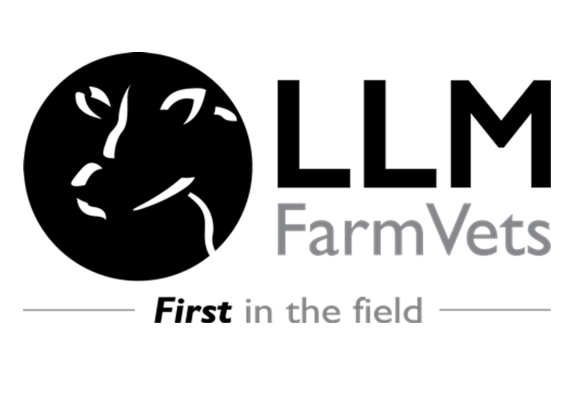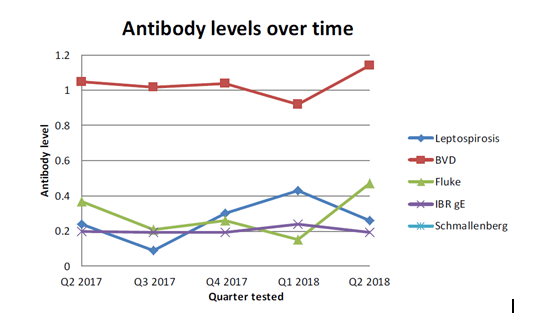
A Simple Solution for Monitoring Infectious Diseases
Infectious diseases can have a negative impact on both the health and productivity of dairy herds. Although there are many ways to control the entry and spread of these diseases, it is important to know your current status so you can choose the most suitable management strategies for your farm. Sarah Gibbs from Lambert, Leonard & May (LLM) Farm Vets shares some important advice.
In dairy herds, a simple way of monitoring disease exposure is by measuring bulk milk antibodies. Antibodies are part of the cow’s immune defence and are produced in response to disease challenge. The antibodies produced are specific to each infection and pass freely into the milk where they can be measured. A bulk milk sample can, therefore, give a good guide as to the level of herd exposure.
Similarly to natural infection, vaccination will cause an antibody response and this is the route by which it protects an animal. Vaccination status must, therefore, be considered when interpreting bulk milk results.
LLM has launched the ‘Infectious Disease Check’ service. This monitoring tool uses quarterly bulk milk samples to track disease exposure in our dairy herds. By pro-actively testing herds LLM help dairy farmers stay one step ahead and can prevent potentially costly disease outbreaks.
How Infectious Disease Check works
Bulk milk samples are collected on a quarterly basis and tested for antibodies to four key diseases which affect herd health: BVD, IBR, Leptospirosis and Fluke. On a proportion of farms, samples are also tested for Schmallenberg.
Working with CIS LLM have tried to make this process as hassle-free as possible; automatically testing herds which are milk recording and sending sample pots to others.
Results are interpreted alongside the herd vaccination history and a report is made including veterinary advice. The service is completely free of charge and available to all of LLM dairy clients.
Infectious Disease Check was launched in May 2018 and LLM now have 94% of our dairy herds using the service.

Above is an example of the results from our Infectious Disease Check. By repeat testing, every quarter LLM are able to track trends and detect any increases which may suggest exposure to disease.
The herd in the example above has gone positive for Fluke at the most recent test. Fluke can cause significant production losses and this result has allowed LLM to implement additional control measures prior to seeing any clinical signs.
How it has helped: a herd example
Mr Mottershead has a flying herd milking 170 cows. Purchasing in-calf heifers increases his risk of introducing infectious disease to his farm. In May 2017 LLM started monitoring bulk milk antibody levels through our Infectious Disease Check service.
The first set of results found Mr Mottershead's herd was positive for IBR antibodies. IBR is a common disease in the UK and is caused by a virus which generally affects the respiratory system. Signs of this disease include milk drop, high temperatures, runny eyes/noses and rapid breathing.
When a freshly calved heifer went rapidly off her milk and showed several of these signs LLM decided to do an individual antibody test. This test was repeated a couple of weeks later and confirmed that IBR was the most likely cause of disease. The heifer was treated and returned to milk.
With many diseases, the individual cases of disease which are seen are usually the tip of the iceberg and the true cost is linked to overall reduced performance in the herd. This can be difficult to monitor and quantify and for this reason, LLM decided to initiate whole-herd IBR vaccination.
Since then Mr Mottershead has seen fewer respiratory cases and is confident he has a healthier herd. He is also reassured that by vaccinating incoming heifers the rest of the herd will be protected going forward.
For further information on LLM visit www.lambertleonardmay.co.uk
